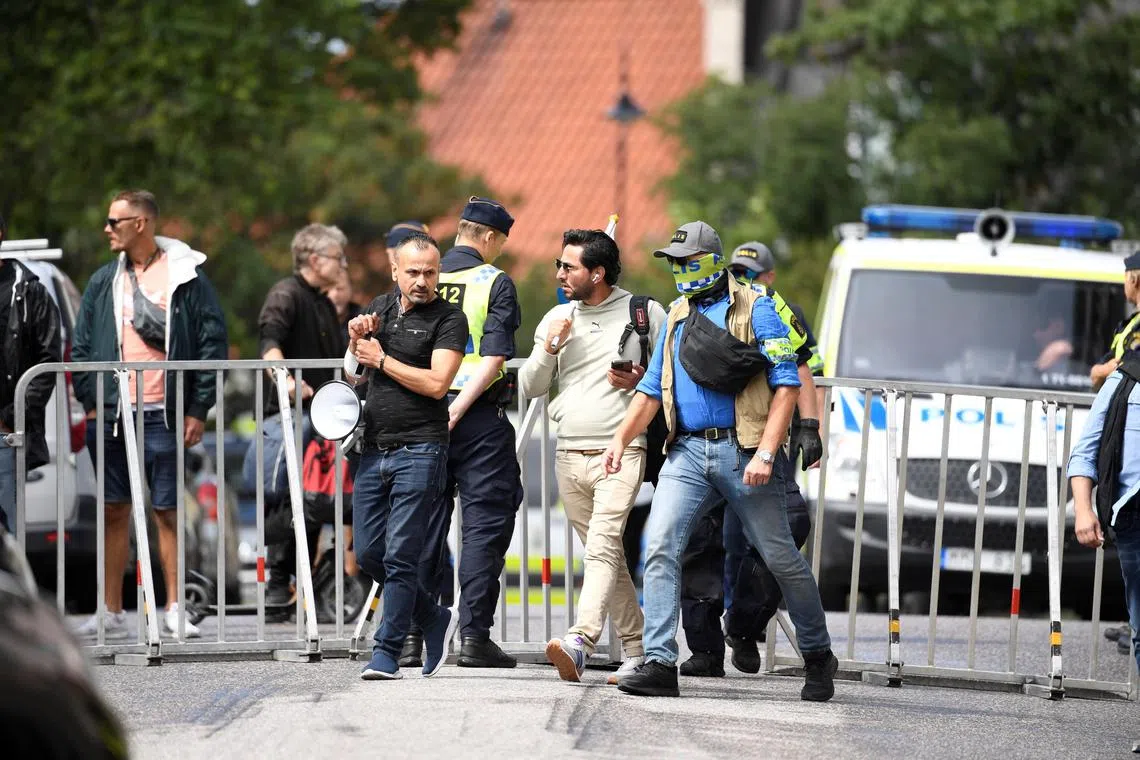Iraq expels Swedish ambassador over planned Quran burning
Sign up now: Get ST's newsletters delivered to your inbox

Most protesters had withdrawn, and Iraqi security forces later charged at a few dozen protesters still milling around outside the embassy.
PHOTO: REUTERS
BAGHDAD – Iraq expelled the Swedish ambassador on Thursday in protest against a planned burning of the Quran in Stockholm that had prompted hundreds of protesters to storm and set alight the Swedish embassy in the Iraqi capital.
An Iraqi government statement added that Baghdad was also recalling its charge d’affaires in Sweden, and Iraq’s state news agency reported that the government had suspended the work permit of Swedish telecom giant Ericsson on Iraqi soil.
Protesters in Sweden had applied for and received permission from Swedish police to burn the Quran outside the Iraqi embassy on Thursday.
During the event, the protesters kicked and partially destroyed a book they said was the Quran, but left the area after one hour without setting it on fire.
In remarks about the storming of the Swedish embassy in Iraq, Sweden’s Foreign Minister Tobias Billstrom said embassy staff were safe.
But he said the Iraqi authorities had failed in their responsibility to protect the embassy in accordance with the Vienna Convention.
The US State Department has since said the United States strongly condemns the embassy attack.
The Iraqi government earlier expressed similar sentiments, according to a statement from the office of Iraqi Prime Minister Mohammed Shia Al-Sudani. It declared the incident a security breach and vowed to protect diplomatic missions.
But Baghdad also “informed the Swedish government... that any recurrence of the incident involving the burning of the Holy Quran on Swedish soil would necessitate severing diplomatic relations”, the earlier statement said.
The decision to recall the charge d’affaires to Sweden came while the protest in Stockholm had started, but before the protesters had left without burning the Quran.
Mr Billstrom said the storming of the embassy was “completely unacceptable, and the government strongly condemns these attacks”.
He added: “The government is in contact with high-level Iraqi representatives to express our dismay.”
Thursday’s protest in Baghdad was called by supporters of Shi’ite cleric Muqtada Sadr, according to posts in a popular Telegram group linked to the influential cleric and other pro-Sadr media.
Mr Sadr, one of Iraq’s most powerful figures, commands hundreds of thousands of followers whom he has at times called to the streets, including last summer when they occupied Baghdad’s heavily fortified Green Zone and engaged in deadly clashes.
Swedish police on Wednesday granted an application for a public meeting outside the Iraqi embassy
Swedish news agency TT reported that the duo had planned to burn the Quran and the Iraqi flag at the public meeting. One of them is a man who set a Quran on fire outside a Stockholm mosque in June.
Swedish police denied several applications earlier in 2023 for protests that were set to include burning the Quran, citing security concerns.
Courts have since overturned the police’s decisions, saying such acts are protected by the country’s far-reaching freedom of speech laws.
The Swedish government said earlier in July that it is considering changing the law to allow police to stop people from setting the Quran on fire in public, if it endangered Sweden’s security.
In Iraq, a series of videos posted by One Baghdad, a popular Telegram channel that supports Mr Sadr, showed people gathering around the embassy at around 1am on Thursday (6am, Singapore time), chanting pro-Sadr slogans and storming the embassy complex around an hour later.
“Yes, yes to the Quran,” protesters chanted.
Videos later showed smoke rising from a building in the embassy complex and protesters standing on its roof. Reuters could not independently verify the authenticity of the videos.
Iraq’s Foreign Ministry condemned the incident, saying in a statement that the Iraqi government had instructed security forces to carry out a swift investigation, identify perpetrators and hold them to account.
By dawn on Thursday, security forces had been deployed inside the embassy and smoke rose from the building as firefighters extinguished stubborn embers, according to Reuters witnesses.
Most protesters had withdrawn, and Iraqi security forces later charged at a few dozen protesters still milling around outside the embassy, in an attempt to clear them from the area.
Protesters had earlier briefly thrown rocks and projectiles towards the large number of security forces gathered.
In late June, Mr Sadr called for protests against Sweden and the expulsion of the Swedish ambassador after the Quran burning in Stockholm by an Iraqi man.
After the burning, the man was reported to police for agitation against an ethnic or national group.
In a newspaper interview, he described himself as an Iraqi refugee seeking to ban the Quran, the central religious text of Islam believed by Muslims to be a revelation from God.
Two major protests took place outside the Swedish embassy in Baghdad in the aftermath of that Quran burning, with protesters breaching the embassy grounds on one occasion.
The government of several Muslim countries, including Iraq, Turkey, the United Arab Emirates, Jordan and Morocco, issued protests against the incident, with Iraq seeking the man’s extradition to face trial in the country.
The US also condemned it, but added that issuing the permit supported freedom of expression and was not an endorsement of the action. REUTERS


